
by Good News | Jan 7, 2022 | January/February 2022, Magazine Articles
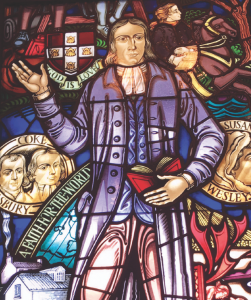
Stained glass of John Wesley at the World Methodist Council Museum, formerly at Lake Junaluska, North Carolina. Photo by Steve Beard.
In honor of the passing of our friend Dr. William J. Abraham, we are republishing an address he presented at the 1995 national gathering of the Confessing Movement Within the United Methodist Church in Atlanta.
By William J. Abraham –
One of the most heartening features of life in the United Methodist Church is the deep yearning for renewal that can be detected at almost all levels of the church. In the patchwork of renewal movements within the United Methodist Church, the Confessing Movement focuses quite deliberately on the need for our denomination as a whole to be faithful to the deep doctrinal treasures of the church across the ages which are spelled out so clearly in the Articles of Religion, The Confession of Faith, and in Wesley’s Sermons and Explanatory Notes on the New Testament. Equally, it calls the church to lift high these doctrinal treasures for the whole life of the church in evangelism, liturgy, mission, pastoral care, social action, and every aspect of the work of the church. Implicit in this call to fidelity, reform, and renewal is the judgment that we have neglected these doctrinal treasures or, more seriously, that we have replaced these treasures with alien doctrinal material, which distorts our tradition, which separates us from each other and from the classical faith of the church, and which undermines crucial aspects of our life and mission together.
Why do we need a confessing movement? There are at least four very substantial reasons.
1. The substance and content of the faith have been called into question in our culture and more conspicuously within the church at large.
We are aware that our culture has become radically more and more pluralistic during the last generation. This is something we neither condemn nor applaud. In the providence of God we are called to serve the gospel at a time of momentous changes. God has sent us forth into a free marketplace of religions, ideas, fads, philosophies, and ideologies. In these circumstances, it is patently clear that we can no longer depend on the culture to transmit Christian faith in the public institutions of the land, such as the law, the news media, the academy, and the public education system. On the contrary, we can expect vigorous engagement in the public arena, if not downright hostile attack. We are not surprised, then, when we find the essentials of the faith called into question by intellectual leaders and scholars.
It is another matter entirely, however, when the faith of the church expressed in our doctrinal standards is called into question by those who want to remake or reimagine the faith in ways which repudiate the great classical doctrines of the church universal. There are those who want to displace the revelation enshrined in the Scriptures by attempting to replace it with an appeal to various forms of reason and experience. There are those who want to reject or set aside the Scriptures because they have invented their own canon. There are those who openly repudiate the Trinity because it is believed to be linguistically oppressive. There are those who reject the full divinity and humanity of Jesus Christ because they think it is supernaturalistic or incoherent. There are those who repudiate the atonement wrought by Christ because they think it is a case of divine child abuse. There are those who reject the universal saving work of Jesus Christ because they think they can save themselves with their own religion. There are those who repudiate the evangelistic and missionary activity of the church because they find it too offensive and intolerant in a pluralistic world. There are those who want to set aside the quest for righteousness and holiness because it does not fit with the mores of a new generation.
In these circumstances it is imperative that the church be clear about its core doctrines concerning the Trinity, the full divinity and humanity of Jesus Christ, and the complete sufficiency of God’s saving action in Christ. In these circumstances silence is a form of collusion. There is at this moment in history a clear need for the church to confess boldly and clearly the faith by which it lives and dies.
2. As a church we have in reality been committed to a form of practical, doctrinal incoherence for a generation or more.
Throughout the last generation the UM Church has been suffering from an acute case of doctrinal amnesia and of doctrinal dyslexia. I have chosen these images very carefully. In the case of amnesia the analogy is self-explanatory. We have simply forgotten our doctrinal heritage and hence have ignored its rich treasures and reserves. In some respects, however, the analogy with dyslexia is more compelling. As anyone suffering from dyslexia knows, the crucial problem is that one sees the relevant marks on the page but the marks are ingested in a distorted fashion. In the case of doctrinal dyslexia, what happens is analogous to this condition. In our case what has happened is that we have turned inside out and upside down the crucial material on doctrine in the Book of Discipline. We have displaced the actual standards of doctrine laid out in the Constitution by concentrating on the highly speculative material laid out in the section on our theological task.
At a crude and popular level we have replaced the great doctrinal verities of the faith, which are laid out so carefully in the Articles of Religion, The Confession of Faith, and in Wesley’s Sermons and Explanatory Notes on the New Testament, with the famous Methodist “quadrilateral.” We have replaced commitment to the great doctrines of the church with a commitment to a speculative theory of religious knowledge. We have replaced content with process, sacrificing the possibility of a publicly agreed common mind to the actuality of a partisan, conjectural theological method.
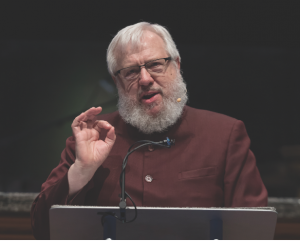
The Rev. Dr. William J. Abraham speaks at the Fourth Global Gathering of the Wesleyan Covenant Association in Tulsa, Oklahoma, in November 2019. Photo: Mark Moore
The consequence is that our identity is now shaped by an interesting but dubious exercise in religious theory of knowledge. On pain of denying our tradition, we are forced to confess adherence to a piece of clever epistemology which was worked out in the 1960s and which is at odds both with Wesley and with the clear content of the constitutional standards of doctrine. In these circumstances the great classical doctrines of the faith, to which Wesley wholeheartedly adhered, are treated as optional alternatives to be received, rejected, remade, or reimagined at will. We have idolized a piece of philosophical speculation and are now reaping the consequences. Not surprisingly, we find ourselves torn asunder by conflicting doctrinal proposals. The quadrilateral effectively fosters this situation. It invites us to evaluate our beliefs and doctrinal suggestions by running them through Scripture, tradition, reason, and experience. As a pedagogical device, the quadrilateral indeed has merit. Anyone who is a teacher can testify to this. However, as a formal proposal in the field of religious knowledge, the quadrilateral is an absurd undertaking, for only an omniscient agent could seriously undertake to run our proposals through the gamut of Scripture, tradition, reason, and experience. Only God could use the quadrilateral and, thankfully, God does not need it. What actually happens, of course, is that folk make a good faith effort to meet this grandiose standard, but the considerations are so diverse and complicated that the result is a wild array of alternatives. The quadrilateral is much like a kaleidoscope. Each time you shake Scripture, tradition, reason, and experience, a different configuration emerges. The result is doctrinal chaos and incoherence. Even Albert Outler, the great architect of the Methodist quadrilateral, was disturbed by its misuse, and late in life expressed reservations about its logic.
This, of course, is what we get when we use the quadrilateral at its best. At its worst, our use of the quadrilateral is like a lateral in football; if you cannot support your position by one element in the quadrilateral then use a lateral pass to tradition, reason, or experience until you get the support you need. In this instance the quadrilateral is simply a camouflage for any and every doctrinal proposal. It is clearly at odds with the much more modest and nuanced appeal to Scripture carefully stated in the Articles of Religion and The Confession of Faith.
It is in this whole arena that we need very significant reform. Currently, the self-image of United Methodists reflects non-commitment to any specific doctrines. At best it adheres to a version of the Methodist quadrilateral. Against this I want to suggest that the UM Church is a confessional church. We have a clear body of Christian doctrine spelled out in our doctrinal standards. Broadly speaking, these standards commit us to the classical faith of the church developed during the patristic period and the Reformation and laid out in the Articles of Religion and The Confession of Faith. Equally, they commit us to the Wesleyan distinctives laid out in Wesley’s Sermons and Explanatory Notes on the New Testament. Where we are currently required in practice to accept a speculative theory of religious knowledge, the UM Church in its Constitution invites us to accept and explore the rich treasures embodied in the classical and Wesleyan traditions. It is high time that we enter into a new doctrinal reformation which comes to terms with this historical reality.
3. Doctrinal considerations are foundational to virtually every aspect of our life and faith, and nothing short of this will challenge the internal secularization of the church as a whole.
The Methodist movement, which sprang up in the eighteenth century, was part of a profound spiritual awakening which cannot be understood apart from the deep gospel truths which animated its leaders and workers. Methodists laid hold of the faith of the church, opened themselves to the active presence of the Holy Spirit, found themselves gloriously converted, and were then propelled into a spiraling movement of evangelism and social action. This was clearly a mighty work of providence which depended on very specific doctrinal commitments such as we find in the doctrines of creation, redemption, grace, justification, and sanctification. Take away these doctrines and Methodism is unintelligible and unworkable. Doctrinal commitments inform and enter into our work in evangelism, worship, social action, pastoral care, ecumenism, and administration.
Increasingly, with the rise of various secular disciplines that reject or ignore theological considerations, there has been a marked tendency to envisage our work in entirely naturalistic, secular, or procedural categories. Worship is reduced to entertainment or to purely aesthetic dimensions; administration is reduced to the logic of management; social action is cast entirely in humanitarian categories; evangelism is interpreted primarily in terms of nominal church membership; pastoral care is cast in terms of therapy; the election of bishops is turned into political campaigning; preaching is reduced to moralism; prayer becomes a form of comfort and auto-suggestion; the Scriptures are reduced to a set of sacred texts; Christian theology becomes an exercise in philosophical or ideological speculation.
The issue of course is a delicate one, for all truth is God’s truth, and we are free, therefore, to baptize all sorts of material for use in the church. Only a fool would refuse to plunder the secular “Egyptians” of our day and generation. However, our first and primary identity in the church is that we are the Body of Jesus Christ, equipped with a whole tapestry of insight expressed in the great doctrines of the faith and overshadowed by the mystery of the living God. Hence, as United Methodists, we live in and for the kingdom of God, not some secular substitute. In our worship we are committed to the great sacraments of baptism and eucharist, where we look to the Holy Spirit to wash us from our sins and feed us with the bread of heaven. We read the Scriptures not as an exercise in sacred archaeology but as the living Word of God. In evangelism, rather than simply adding members to the church, we seek to let the Holy Spirit deliver us from the bondage of original sin. In social action, rather than pursue the ideals of this or that political party, we seek to let God’s rule enter every nook and cranny of our social existence. In pastoral care, we are committed to the cure of souls; in administration we are looking to the Holy Spirit to give the whole church all the gifts that are needed to be agents of the kingdom; in the election of bishops we are seeking to find the charismatic gift of oversight in the church as a whole; in prayer we are entering the very courts of heaven itself; in preaching we are proclaiming and expounding the Word of God; in Christian theology we are in faith seeking understanding.
Conceived in this fashion, our work in the church is encoded by doctrinal themes and convictions. It is not that we somehow conjure up a set of doctrines and then apply them to this or that element in the life of the church. Doctrine is built into the very conception and execution of our work together. In the face of the widespread secularization of our culture and the strong temptation to mimic the ways of the world, it is vital that we remain steeped in the doctrinal riches of the faith. In this way our life and work together can truly represent the action of the Body of Christ and be filled with the direction of the Holy Spirit. Hence we can by grace be a city set on a hill, an outpost of the kingdom of God, and a vineyard truly built of the Lord, rather than one more social club, or our favored political party at prayer, or an insipid nursemaid to the secular state.
4. There is a need to heal the deep alienation and the sense of intellectual exclusion which exists in significant segments of the church at large.
What is at stake here is far from easy to describe. Let me try as best I can. I will do so by providing a tendentious narrative which will deliberately exaggerate in order to make the crucial point at issue. Ostensibly, United Methodism is an open, inclusivist denomination. We have prided ourselves on welcoming the stranger, on providing a spiritual home for those who have felt they were oppressed in other traditions, and on being a community where people are free to think for themselves. Moreover, we have worked exceedingly hard to empower women and ethnic minorities. These are virtues which very few, if any, in United Methodism would want to forfeit.
Yet this is not the whole story. At the end of the last century, the leadership of the forbearers of modern United Methodism made a strategic decision that has never been adequately faced and worked through. At a time of enormous intellectual and social crisis, we opted to become the leaders of the liberal Protestant movement in North America. Believing that the classical Methodist tradition could not really be defended in the modern world, we adopted a revisionist pose which dismantled the classical faith of Methodism. Like the leaders in most mainline churches we lost our intellectual nerve and elected for massive accommodation to the intellectual elites of the culture.
This was an understandable decision, for liberal Protestants insisted that there was no other way to face the intellectual and social challenges of the day. Hence they felt that they could quietly ignore or dismantle vast tracks of the Christian heritage without shedding any theological tear. This shift – developed quite brilliantly, for example, at Boston School of Theology (which became a kind of Vatican of the tradition as a whole) – was taken as a given by much of the intellectual leadership of our tradition in the twentieth century. Any alternative seemed a perpetuation of a doctrinal dark ages which needed to be enlightened by all that was best in the modern world.
As a consequence, Methodism became theologically schizophrenic. Our roots, our hymnody, our founding documents were wholehearted steeped in the classical Christian tradition, but many of our leaders have been deeply alienated from this whole heritage, even though they had to work overtime to provide a semblance of intellectual coherence for themselves. Over time the fortunes of liberal Protestantism have waxed and waned. Liberal Protestantism was deeply challenged by the rise of Neoorthodoxy before and after the Second World War, but this was relatively easily contained by arguing that the work of Barth and the Niebuhrs was really a moment of self-correction in the development of liberal Protestantism. It was, for a time, given bad press with the arrival of the “God is dead” movement of the 1960s, but this was more of a media event than it was a serious threat to the standing orders of the great liberal Protestant experiment. Overall, during this period the intellectual institutions of United Methodism were a closed shop. It was the exception rather than the rule when someone who was committed to the classical faith of the church was permitted entrance. Too often they were dismissed doctrinally as intellectual illiterates.
As a consequence, many faithful United Methodists were shut out of crucial centers of the church’s life. They did what any group will do under such circumstances: they became frustrated, angry, fidgety, and alienated. Being what all United Methodists are, namely, inveterate, pragmatic activists, they also went to work. Over time they funded and built their own institutions, set up their own parachurch organizations and caucuses, got themselves educated, printed their own literature, held their revival meetings at the grass roots, set up an alternative mission society, and above all, poured themselves into evangelism and church growth. At the same time they worked as best they could within the system, being as loyal as they knew how to the church whose faith they treasured.
Liberal Protestantism is again in serious trouble within the academy. It is challenged on one side by the development of various forms of radical Protestantism and on the other side by a resurgent recovery of evangelical and patristic sensibilities in theology. Some academic institutions have even opened their doors, albeit in fear and trembling, to those who do not share the revisionist agenda. The ethos of liberal Protestantism, however lingers on in the tradition as a whole. Almost all have been preoccupied by a multicultural agenda that focuses on a form of diversity which masks deep opposition to the classical faith of the church on the grounds that it is incredible and oppressive. The inevitable consequence has been that many conservative and traditional United Methodists remain deeply alienated within the tradition as a whole.
We need a vigorous confessing movement at this moment in our history in order to give voice to those who have been systematically excluded from the central life of the church. Members who are committed to the classical doctrines of the faith need to know that they are not alone, that there are others who share their exclusion, that they can be fully Christian within the United Methodist tradition, and that they can learn and relearn the classical faith of the church. In short, there are many within United Methodism who need a space where they can be healed and intellectually renewed to serve the present age. They need a movement in which they can own their own tradition with integrity and deepen their hold on the doctrinal treasures of the church.
Our concern is with doctrine. Without adequate attention to this crucial dimension of our life together we will become antinomians, pharisees, and intellectual anarchists. Worse still, we will become emotionalists, frenetic activists, and even apostates from the faith once delivered to the saints. With proper attention to doctrine we will continue to be part of that great succession of evangelists, saints, and martyrs who, in the church catholic across the ages, have borne a faithful testimony to our great God and Savior Jesus Christ.
This essay was published in the January/February 1996 issue of Good News.

by Good News | Jan 6, 2022 | January/February 2022, Magazine Articles

A solar-powered radio allows Tunui Metuni to listen to Trinity FM while tending his family’s livestock in Samburu County, Kenya. Photo by Faith Wanjiru, UM News.
By Faith Wanjiru, UM News –
The Rev. Josam Kariuki of Trinity United Methodist Church in Narok, Kenya, and other clergy began livestreaming worship services and sharing messages of hope during the COVID-19 pandemic. The livestream, however, was only getting to followers who had smartphones.
“A good number of my followers,” he said, “use button phones. Others don’t own mobile phones. I needed to reach them all, especially when they required spiritual, emotional and material support.”
Kariuki decided to start the church’s own radio and television station to reach the most vulnerable communities in slums and the interior areas of Narok with vital information. He created space for the station on the church’s premises.
Though ill-equipped, with only a single video camera and a radio recorder, Trinity Radio and Television has been on the air for a year. Because it is so new, the station is surviving on the goodwill of local churches. Its skeletal staff of eight workers includes six volunteers.
Kariuki is seeking partnerships to help the station remain afloat. Partners could buy video cameras and other equipment or donate solar-powered portable radios and televisions, recorders, transmitters and computers. The pastor is also looking for sponsored programs and media-trained volunteers.
“The sponsored programs and the financial aid,” he said, “will help to train employed staff.” Often, volunteers leave for paid jobs. Another major challenge for the new station is access to remote areas to collect news.
The pandemic, Kariuki said, came with numerous problems due to prolonged school holidays, collapsed businesses, job losses and stay-at-home orders. Many people started working from home.
“This had adverse effects in many slum areas and rural areas of Narok, with a recorded rise in domestic gender-based violence, female genital mutilation, early marriages, teenage pregnancies, child labor and defilements,” he said.
Chief Lesiti Muturo said Trinity Radio and Television instructs the community about their rights and available government resources. Women learn about family planning, the importance of education and other subjects.
After the closure of schools in 2020 because of COVID-19, the church radio station began broadcasting school programs to children in a local language. School-age children, said teacher Paul Sitinei, “enjoy songs, Bible readings and entertainment programs.”
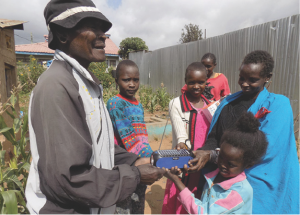
Saloton Ntutu and his family in Narok, Kenya, enjoy listening to Masai songs on Trinity FM. They received the radio as a
donation from Trinity United Methodist Church. Photo by Faith Wanjiru, UM News.
Using the three bilingual stations that broadcast in Kikuyu, Maasai and Samburu, Kariuki said he has planted five new congregations. “We can now preach through the media in our local language,” said Pastor Melisa Soipan of Narok United Methodist Church. “It is impossible to reach our followers through social media like Facebook because there is no internet access.”
Moses Kwaro agreed. “We are proud because we have been remembered and cared for,” he said.
“We are very happy,” leader Tabitha Tumangah said, “because (we) are getting national news in our Maasai language.
This is beneficial to our people who do not understand English and Swahili.” She added that the church’s mission team is mobilizing them to have solar-powered radio because their region lacks electricity.
The radio can be listened to worldwide through the Facebook pages Trinity FM Kenya and Trinity TV Kenya and the website https://umckenya.org/tv/. Trinity Radio and Television reaches the Kikuyu, Maasai and Samburu communities.
Faith Wanjiru is communications director for the Central/Narok District of the Kenya-Ethiopia Conference. For more information, contact Trinity United Methodist Church Mission Coordinator Solomon Kimani at trinity@umckenya.org.

by Good News | Jan 6, 2022 | January/February 2022, Magazine Articles

Photo: Shutterstock
By JJ Mannschreck –
Speaking as a young clergy with a (God willing) long career in front of me, I think it’s important for me to explain why some of us are considering going with the Global Methodist Church (GMC).
1. The Definition of Progressive. There’s a lot of noise being made in the current church conversation about big tents and long tables. Progressive voices and institutionalists are talking about how welcoming they will be for traditionalist voices. “You don’t have to leave” they say, “we will make room for and respect all theologies.” And to be honest, I want to believe them. But if the issue of LGBTQ inclusion is a justice issue – which I’ve heard many, many times – then, at best, what we are going to see is a temporary tolerance.
The definition of progressive is that they understand their ideology as progress. Assimilation is built into their identity. One can assume that they can and will be very kind for a season – but eventually the call of justice will not be content to permit “oppressive theologies” in the room. There will probably be a few years in the Post Separation UM Church (PSUMC) where it will be safe and even comfortable for traditionalist clergy to do ministry. But it will probably get progressively worse for them as the years go by. For those nearing retirement, it might even be the easier choice to stay. But I am not near retirement. I am a young traditionalist clergy. I have no desire to be part of a tradition that will resent me just a little bit more every year for my entire career.
2. United By Mission Alone. It is time for all Methodist traditions (both PSUMC and GMC) to eliminate the Trust Clause. The Trust Clause coerces unity that isn’t really there. The Global Methodist Church has made it clear that autonomy in the local church will be the name of the game, whereas the PSUMC has no intention of getting rid of its hold over congregations. Without a legally binding, practical, and financial threat to keep unity in the ranks, the Global Methodist Church will rely on missional alignment. Rather than being yoked together by rule of law, we will be able to walk next to one another – and work together freely.
3. The Call System (and Guaranteed Appointments). Along with the trust clause, the itinerant system should be eliminated. The current method of appointment for pastors does have its conveniences – but the disadvantages significantly outweigh the advantages. It is a system that can very easily, even if accidentally, breed deep abuse and scandal. Beyond potential abuses, it enables toxic churches and ineffective clergy to point fingers at one another for decades without accountability. I’ve seen this in my own conference in countless examples. The Global Methodist Church is shifting only slightly, to a partial call system. This will be challenging at first. Churches will have a steep learning curve on interviewing pastors. Toxic churches will shrivel and ineffective pastors will struggle to find good churches, but all of those things will ultimately lead to a healthier denomination down the line.
4. Becoming a Minority. I am a very privileged, young heterosexual white man. While I may not come from a fabulously wealthy family and I never had a pony growing up, the reality is that I grew up in extremely comfortable conditions. I believe there is a racial and cultural realignment coming for the church – and I am here for it. I am eager to be a part of a church that is multiracial and where leadership is more equitably shared between Africans, Filipinos, and Caucasians from the United States, Europe, and Russia.
Our African brothers and sisters have lived with a system of inequity for decades. It saddens me to see progressive voices making a lot of noise about regionalization at the exact historical moment when multiracial voices are finding prominence in the power dynamics. Rhetorically, institutionalists talk a lot about diversity – they want Africans in the room – it just seems that they don’t want to have to listen to them. Regionalization is not justice. Make no mistake, it is an injustice issue, and nothing else. The Global Methodist Church, particularly the white conservatives in America, will have a lot to learn in a short amount of time. There is racism buried beneath the surface of some of our congregations, and we will have to deal with that if we are to flourish.
5. Governance Structure – the local Church. The core of my desire for movement to the Global Methodist Church lies in the nitty gritty of church organization. I don’t believe institutionalists or even progressives are bad people. I will miss many of my colleagues, and I wish them blessings in the future from the bottom of my heart. But when I look at the two structures, one system is simply better. For a long time the UM Church has paid lip service to the fact that the front lines of ministry are in the local church. And yet, in my experience and in what I have seen around the country, this is not a practical reality.
In my conference, pastors are actively running away from local church ministry, often seeking out the coveted conference level staffing positions. Despite the financial difficulties and combining of structures, the conference level staff continues to grow. In recent months, they have done a good job of re-orienting back toward the local church, particularly since COVID – but it is still an extremely top heavy structure. There’s a whole lot of apportionment money going to support these massive staffs and the resources they provide (which a majority of churches do not make use of). This is only more pronounced when we consider the massive dollar amounts attached to the work at the General Church level as well.
The Global Methodist Church is offering a far more streamlined organization. In dollars and cents, it will probably cost my church half what it currently does to be a part of that structure. On a practical level, we will send less money up to the denomination, and more money will be left for the local church to do ministry in our community. In rough estimation we expect to move from 14 percent of our budget going up to support the conference down to 7 percent. District Superintendents (or whatever they will be called) will not be seen as a promotional escape from local church ministry, but rather an extra responsibility – possibly on top of local church ministry – taken up as an honor. I have seen some say that the GMC’s Transitional Book of Doctrines and Discipline (which is significantly shorter than the current UMC BOD) is too short. Critics claim that clearly they didn’t think hard enough if they wrote such a streamlined structure. But I look at the bloated structures of the current UM Church and I believe that a simpler way is possible (and preferable).
 What is not on my list of five points? The conversation about LGBTQ inclusion does not even arise (except perhaps tangentially in the first reason). I do not want to move to the Global Methodist Church because of a disagreement over homosexuality. Despite what progressives have been screaming for years, I don’t “hate” gay people. To be honest, I can easily make this decision without even considering that part of the discussion. I would make my way to the GMC on their call system alone, or their governing structures, or their removal of the trust clause. All of these are practical, straightforward reasons that the Global Methodist Church will be a stronger church in the long run.
What is not on my list of five points? The conversation about LGBTQ inclusion does not even arise (except perhaps tangentially in the first reason). I do not want to move to the Global Methodist Church because of a disagreement over homosexuality. Despite what progressives have been screaming for years, I don’t “hate” gay people. To be honest, I can easily make this decision without even considering that part of the discussion. I would make my way to the GMC on their call system alone, or their governing structures, or their removal of the trust clause. All of these are practical, straightforward reasons that the Global Methodist Church will be a stronger church in the long run.
I know that LGBTQ+ inclusion is the flashy headline. Mainstream media, if they notice this split at all, will talk about how the church is dividing over homosexuality. They have never had much interest in nuance, or really any differences that don’t grab people’s attention. I don’t expect a fair hearing in the public square. Inclusion may have been the lightning bolt that struck the church and lit the roof on fire – but after the flames died down, they revealed a rotting structure set on a leaky foundation. It’s time to build a new house.
For what it is worth, I will be entering through the doorway into the Global Methodist Church, just as soon as they unlock the door.
JJ Mannschreck is the pastor of Flushing United Methodist Church in Michigan.

by Good News | Jan 6, 2022 | January/February 2022, Magazine Articles
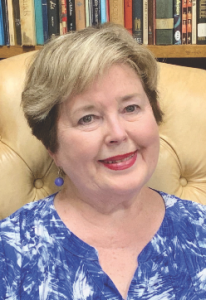 By B.J. Funk –
By B.J. Funk –
Before my mother-in-law left for heaven, she was trapped in her limited body by a debilitating stroke. For five years, she lay motionless in the bed, unable to speak or communicate.
Christmas came. Roy and I traveled from sunny South Georgia to the snow laden streets of Burlington, Michigan, our first time to see his mother after her stroke. Mr. Funk greeted us with a huge hug before we walked into the living room of the old farmhouse, the dark walls mirroring the wood stove’s orange glow. This living room always held family memories, but on this night, it held medicinal memories. Rubbing alcohol, herbal supplements, vapor rub, and others. It had been transformed into a hospital room where Roy’s mother lay. Low lights and complete silence called us to want to turn the darkness to light. But, how? It seemed impossible How are you? sounded cruel. Merry Christmas sounded inappropriate.
As we walked to her bedside, her limited eye contact was startling as was her inability to welcome us. We weren’t prepared for a silent Eleanor Funk. Nor that her left arm would not reach up to welcome us as she lay under the covers. It seemed we had nothing to give her but our stares of unbelief and grief. We felt helpless and overwhelmed.
The next morning, Roy and his dad went outside to repair some farm equipment. I pulled up a chair by my mother-in-law’s left side, gently stroking her soft face. Suddenly, as if guided by an unseen hand, I opened my Bible and began reading the Christmas story from the book of Luke. Likely, my words would fall on unreceptive ears. Even as powerful as these words would be, my heart just wasn’t in it.
“In that region there were shepherds living in the field keeping watch over their flocks by night” (Luke 2:8).
Eleanor moved her head toward mine. Wait a minute! Eleanor moved her head! She looked straight at me! I continued reading. “But the angel said unto them, ‘Do not be afraid. I am bringing you good news of great joy for all people. To you is born this day in the city of David a Savior who is Christ the Lord’” (Luke 2:11).
Eleanor locked eyes with me. Wait a minute! Eleanor locked eyes with me! Her stare never wavered as I continued reading through verse 40, my head bobbing up and down from her eyes to the Bible and back again.
“The child grew and became strong, filled with wisdom, and the favor of God was upon Him” (Luke 2:40).
I could not hold back the tears. Suddenly, the beauty of the Christmas story fell all over me, and it was as if I were hearing this Scripture for the first time. I drank in the truth that God loved me enough to send a Savior.
She still watched as I grabbed a tissue. We were now sitting – not in a room of medicinal odors – but in the very presence of God. Eleanor and I had suddenly stepped off of earth and onto Holy Ground. Then, the real miracle happened.
I heard the sheet rustling as Eleanor slowly moved her left arm out from the covers and reached for my hand. We sat there, caught in a divine moment. Our eyes were locked and our hands warmed in the other’s embrace. I didn’t say anything. She couldn’t say anything. It was the most beautiful conversation I ever had with my Mother-in-Law.
Every day we were there, I read the Bible to her. Other family members took their turn. For those of us gathered around her bedside, we learned anew the true meaning of Christmas. It was not in the Christmas tree. There wasn’t one. Nor in cookies. There weren’t any. Nor in presents or lights.
The essence of Christmas, however, shone around her bedside, its brilliance warming our hearts and causing us to reevaluate, even to rededicate our lives in those short hours with Eleanor. Christmas was everything it needed to be. Jesus was everything he needed to be. He was and is all the world to mankind. As he was to Eleanor. As he is to you. As he is to me. It was a sufficiet Christmas indeed! In fact, more than sufficient.
BJ. Funk is Good News’ long-time devotional columnist and author of It’s A Good Day for Grace, available on Amazon.

by Good News | Jan 6, 2022 | January/February 2022, Magazine Articles
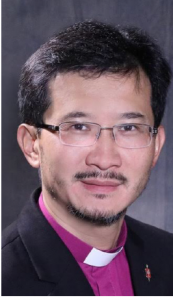 By Bishop Eduard Khegay –
By Bishop Eduard Khegay –
I was born and raised in Almaty, Kazakhstan (former Soviet Union). My ancestors come from an undivided Korea four generation back to the 1860s. I became a Christian in 1992 when I was a student at Moscow State Tech University shortly after the collapse of the Soviet Union. God blessed me richly. I studied in the USA for my M.Div. and D.Min. degrees and met so many wonderful people. In other words, I have Korean blood, Central Asian upbringing, American and Russian education, and a Russian soul.
God has given me the privilege to send and receive missionaries, be part of mission teams in different countries, experience different cultures and languages, do training events, and hear powerful testimonies. The mission movement has the power to change lives, and I want to be part of God’s mission in the world.
The last 30 years have taught me some important lessons from the mission movement in the post-Soviet context. They include many blessings and also problems. And they are often intertwined together. Let me just briefly touch on the few of them.
1. Language, culture, and mentality. There is a powerful scene in Steven Spielberg’s 2004 movie The Terminal when the main hero, Viktor Navorski (played by Tom Hanks) from fictional Krakozhia, helps a Russian man, Mr. Milodragovich, who wants to bring medicine to his ill father in Canada. Frank Dixon, the Acting Field Commissioner of the airport, wants to confiscate the medicine because Mr. Milodragovich has no medicinal purchase license. But Viktor Navorski tells the commissioner that this medicine is actually for a goat. This would allow a person to take the medicine onboard without needing a license. The commissioner understands that Viktor is lying and asks him why about his actions and why he helps a man he does not even know. This scene makes me laugh and cry at the same time. It caricatures the Russian and American men to the point of extremes. But the point is well taken. We grow up with our own language, culture, and mentality, and sometimes it is hard to understand a person from a different country and why they behave the way they do.
I admire missionaries who come to our land and study our language, culture, and mentality. All these things define the way we think and feel. When someone speaks my language and understands our jokes, I feel that this person is one of us and the connection gets much stronger. If someone respects Leo Tolstoy and Fyodor Dostoevsky or Rakhmaninoff and Tchaikovsky, I pay attention to this person and what he or she has to say about God.
On the other hand, it is sad to see missionaries who make little effort to learn the local language and understand our culture. Of course, some people have more talent for learning foreign language than others. But even with limited vocabulary and genuine interest for local culture and the people, a missionary can be effective.
Another issue is using an interpreter. Often times I was the one. Besides the issue of quality of translation and integrity of the interpreter, people may perceive the missionary as a rich foreigner who hires others to do the job. In the context of a poor economy, it may inadvertently create power or status differentiation which did not exist before. And a missionary may not even be aware of that.
2. Reaching goals, building relationships. Most of us who grew up in the Soviet time experienced an authoritarian leadership style which implied that the Communist party sets goals for you. You didn’t have to think and worry about your future. Some people of my generation who were born in the 1970s still have a hard time to dream their own dreams. So, when Western missionaries came to our land and introduced goal setting, strategic planning, and SMART and SWAT analysis, silence was the predominant reaction from our people. It took us many years to figure out how to work with this new paradigm, and we are still on the journey.
Generally speaking, our sisters and brothers from the West were people who wanted to get things done, while our local people value more relationship building. If you come from a place with many resources to a poorer place, you see many possibilities to improve life and your compassionate instincts move you to act. Local people may admire you and follow your leadership until you realize that the future of your mission may seem uncertain after you leave.
It is much harder to invest in building relationships and patiently wait when local leaders would have their own dreams and strategic plans. But isn’t genuine discipleship about building relationships? Westerners feel that we go to extremes and drink too much tea and don’t reach the goals. And they are right. We do talk a lot. We need to work more. But going to another extreme – reaching your goals and missing building relationships – can damage our mission as well. My hope is that mutual learning and edification can help us build great teams for God’s mission both in the West and in the East.
3. East or West, which is the best? The politics of the world’s powerful countries is very polarizing today. I often feel that we are in an era of the Second Cold War. If you are in Russia and speak highly of a Western country, many people may perceive you as traitor. If you are in the USA and speak highly of Russia, you may get in trouble with your friends and colleagues. Is there a Christian way to deal with that? And how can we join God’s mission that will transform people’s hearts and minds so that they can see every human being as a child of God regardless of citizenship?
Nikolai Berdyaev (1874-1948), Russian religious philosopher, wrote in the beginning of the twentieth century that Russian thinking cannot be Eastern or Western. He argued that both of these extremes are not appropriate. His hope for Russia was that she would grow to global leadership and wake up the inner creative activity of the people. We as a church also cannot be Eastern or Western. We are called to be together and bless one another whether we come from East or West, North or South.
Unfortunately, the declining number of mission teams to Russia (even before the pandemic) suggests that the scary politics portrayed by the mass media puts brakes on the mission work internationally. Some people buy cheap news, argue about what is best: East or West, and lose focus on God’s mission.
The Bible challenges us today: “The light shines in the darkness, and the darkness has not overcome it” (John 1:5). The mission of God is about sharing our light with others, especially those who suffer from darkness of spiritual, economic, political and social oppression and deprivation.
Who will go for God and whom shall he send today to share light, build relationships, and learn language, culture and mentality of God’s people?
Bishop Eduard Khegay is the Resident Bishop of Eurasia Episcopal Area in the Northern Europe and Eurasia Central Conference of The United Methodist Church. This is the second of a series of articles provided by TMS Global to platform some important voices in global Methodism.

by Good News | Jan 6, 2022 | January/February 2022, Magazine Articles

Photo: Shutterstock
By Heather Hahn, UM News –
What does a predicted denominational split and an unpredictable pandemic mean for The United Methodist Church’s bottom line? The General Council on Finance and Administration board grappled with that question as members revisited the denomination-wide budget that will go before the coming General Conference.
The finance agency board already was preparing to send the lawmaking assembly the lowest budget in more than 30 years. On December 1, by an 18-1 vote, the board approved shrinking the proposed four-year budget even further to a total of about $407.3 million for the years 2023-2026.
That marks a cut of nearly 33 percent – a third – from the budget General Conference approved in 2016 to support denomination-wide ministries.
The current proposal also would be the lowest budget submitted to General Conference since 1988, according to the denomination’s Commission on Archives and History. At the time, the denomination had about 3 million fewer members than today and had yet to establish Africa University, now supported by denominational funds.
Still, board members stressed that the budget proposal remains very much a work in progress and could change further. They are trying to get a clear picture of what the denomination’s financial base will look like in the near future – and a fog of unknowns clouds their view.
After decades of intensifying debate over LGBTQ marriage and ordination, the coming General Conference faces multiple proposals for a denominational separation. But no person knows how many congregations will depart if a plan of separation passes. Similarly, no one can say when the deadly pandemic will stop upending lives.
“They are projections for things we’ve never done before,” said Christine Dodson, GCFA board vice president who serves on the denomination’s Budget Advisory Team. She also is the treasurer and business manager of the North Carolina Conference. “We don’t have data on how a pandemic and disaffiliation are going to impact our churches moving forward.”
The board does have the educated guesses by leaders of U.S. conferences, the regional bodies that provide the lion’s share of funding for denomination-wide ministries. Both in 2020 and this year, GCFA surveyed conference treasurers, bishops, district superintendents and others to get their best sense of the financial impact of congregational disaffiliations.
Based on this year’s survey, the finance agency now estimates the denomination stands to lose about 25.5 percent of U.S. local church net expenditures by 2025. That’s a bigger loss than projected in last year’s survey, which only asked for estimates through 2024.
The survey results do not mean that conferences expect more than a quarter of U.S. United Methodist churches to depart or close during the next four years. Net expenditures can vary widely by congregation and by circumstance.
What the results do mean is that conference leaders forecast that church departures and closures will result in a substantial decline in one of the key factors used in determining the denomination’s budget.
As it stands, some churches already are leaving without waiting for General Conference to act. GCFA reports that in 2020, 32 U.S. congregations disaffiliated from The United Methodist Church. But that represents only a tiny fraction of the denomination’s more than 31,000 United Methodist churches nationwide.
The Rev. Steve Court, GCFA board member and director of connectional ministries for the East Ohio Conference, told the board that he thought the net-expenditure estimates might be overly negative about what the future holds. “I just want to keep highlighting that because it has real ministry impacts about the level of cutting that we do at this point,” he said.
North Texas Conference Bishop Mike McKee, GCFA board president, agreed with Court that the estimates were far from definitive. McKee said conference leaders tend to answer the disaffiliation question very differently depending on their role. “This is going to be very difficult to forecast,” McKee said. “I’m of the opinion that people will walk more than churches will.” However, he added, that he does not know of any better way to make budget projections.
Heather Hahn is assistant news editor for UM News. Adapted from UM News.







 What is not on my list of five points? The conversation about LGBTQ inclusion does not even arise (except perhaps tangentially in the first reason). I do not want to move to the Global Methodist Church because of a disagreement over homosexuality. Despite what progressives have been screaming for years, I don’t “hate” gay people. To be honest, I can easily make this decision without even considering that part of the discussion. I would make my way to the GMC on their call system alone, or their governing structures, or their removal of the trust clause. All of these are practical, straightforward reasons that the Global Methodist Church will be a stronger church in the long run.
What is not on my list of five points? The conversation about LGBTQ inclusion does not even arise (except perhaps tangentially in the first reason). I do not want to move to the Global Methodist Church because of a disagreement over homosexuality. Despite what progressives have been screaming for years, I don’t “hate” gay people. To be honest, I can easily make this decision without even considering that part of the discussion. I would make my way to the GMC on their call system alone, or their governing structures, or their removal of the trust clause. All of these are practical, straightforward reasons that the Global Methodist Church will be a stronger church in the long run. By B.J. Funk –
By B.J. Funk –  By Bishop Eduard Khegay –
By Bishop Eduard Khegay – 